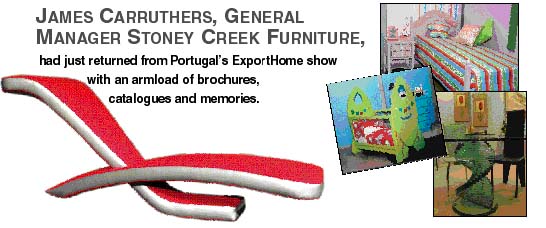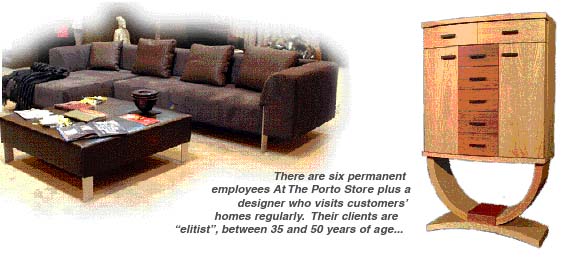A close look at a source of diversified new products from Portugal often overlooked by North American furniture retailers.
"Differentiation is absolutely key. With globalization, the range of choices is limitless. Literally, it’s a world of opportunity.” James Carruthers, General Manager of legendary Stoney Creek Furniture, had just returned from Portugal’s ExportHome show with an armload of brochures, catalogues and memories. He was primed to make educated comparisons between offerings from the Orient, other EU countries and North America.
“Seeing something new to offer our customers”, was the motivation of Jim’s travels. The fifteenth edition of ExportHome was held at Exponor, the huge trade centre located just outside the city of Porto, on the Atlantic northwestern shore of Portugal. It attracted 42,000-plus professionals from 25 countries, hopefully eager to view and buy the offerings of the 750 exhibitors of top class, colourfully displayed, casegoods, upholstery, lighting and accessories. The award winning show, (Mobis “Best Fair of the Sector”) supported and encouraged by the country’s economic development thrust, spotlights “quality and excellence”. The accompanying Design Event, now in its third year, reinforces the theme with its unique design-in-action initiative.

Portugal’s charismatic first lady, Maria Jose Ritta, cut the proverbial ribbon, then she and her entourage toured the display of 25 highly diversified entries and met and talked with the young designers. Each year, manufacturers “adopt” the keen young men and women who compete for honours and this year, Ana Ribeiro and Paulo Meio Veiga pulled off first prize for their flexible, clean cut console table. “Last year we were awarded honourable mention; this year we’ve won!” Other entries were outstanding, some startling, all of superb quality, all aesthetically pleasing.
“It’s a great idea”, said architect Robbie Robjohns. “It’s a growth mechanism for both manufacturers and designers. And it reinforces the industry’s interest in maintaining Portugal’s well deserved reputation for high quality home furnishings.”
Jim was “very impressed with the product, although I felt Portuguese prices were somewhat on the high side for us. A couple of the bedrooms were very tempting. I really appreciate things that are well made. There are certainly some stores in Canada that could handle it. If a group of like-minded retailers got together through a distributor the prices could be manageable.”
Trends at ExportHome were all over the decor map. Rich, warm colour permeated the exhibit halls and the somewhat open displays created a kind of kaleidoscope of wonderfully traditional Iberian looks juxtaposed with sharp, elegant contemporary lines. Textures and shapes were lush and combinations often unexpected and fun. Children’s rooms were delightful with fanciful animal characters finding homes on imaginative headboards, chests and well-proportioned chairs.
Casegoods fashioned after ancient originals to be found in castles and great houses were fascinating. A regal chair combined intricately carved wood, fine leather and marble. The veneers and marquetry enlivening a massive chest were both radiant and precise. Games were taken seriously by the aristocrats of the 17th century and a superb reproduction games table complete with beautifully crafted glass and cigar holders is a treasure in any man’s language.
Fabrics used for traditional upholstery tended to be loose, soft, natural silk in spice tones, a tactile as well as a visual pleasure.
Lighting manufacturers exhibited unbridled enthusiasm for outdoorsy themes and, again, colour was paramount.
It was interesting to discover similarities and differences between North American and Portuguese retailers. Many of the attractive stores in Porto and its sister city, Vila Nova da Gaia, just across the Douro River, are factory owned. Some began as interior designers, ventured into manufacturing and then, with the intent of controlling the presentation of their product lines to the consumer, opened their own stores. All value producer/consumer interaction. “It really helps us to hear first hand what the people want in their houses.”
Jose Martins is in his early forties. In 1982, the young designer evolved a new concept, the crafting of exquisite, unique hand made furniture, signed, numbered, each piece with its own certificate of origin, “a symbol of quality”. His initiative is a winner. Jose Martins Interiores now has a network of lovely boutique like stores, as well as a permanent showroom. Apart from the Porto store, his franchising system includes outlets in Leiria, another in Algarve and one in Lisbon soon to open. There are six permanent employees at the Porto store, plus a designer who visits customers’ homes regularly. Their clients are “elitist, between 35 and 50 years of age, mostly university graduates, business people, doctors, architects, football players, even the Lord Mayor!”

The product line is promoted through shows such as ExportHome, a “very organized and attractive catalogue” and advertising in shelter magazines. They also maintain a preferred customer list used as an information vehicle for new product lines and exhibitions. “We try to be as close as possible to our clients. This is a very important factor for a successful business. Even when a sale is made through one of our agents, we maintain contact with the final customer through our certificate of origin. This enables customers to contact us to give us their opinions, present a complaint or to ask for information.”
Fago (Fabrica de Moveis de Gondomar) was founded in July, 1952. The company’s product lines from the outset have been developed hand in hand with a team of architects and designers. A division was created to define trends, new technologies and product direction. Fago people visit all the important international shows to keep abreast of the global market.
There are two Fago stores, one in downtown Porto, the second in Matosinhos, a city near Porto. Fago serves professionals, 25 to 45, similar to J. M. Interiores. There are three designers on staff who visit customers’ homes and delivery and set up are part of Fago’s highly regarded customer service philosophy. Personal letters, other direct mail vehicles and newspaper and magazine advertising keep Fago’s consumer image alive and well.
Both companies are hopeful that the “world and Portuguese economies will improve this year” and were working towards increased sales and profitability. They agree with Jim Carruthers that “differentiation” is key.
Portugal is a whole lot more than an exciting place to do business. Think about the possibility of an unusual vintage holiday this fall in pursuit of port wine, one of the country’s greatest treasures. Follow your palate to port country in the Douro Mountains, about 200 kilometres north and east of the twin cities. On the way by car, train or boat, there are dazzling views of endless mountains, closely terraced vineyards and a necklace of misty valleys stretching all the way to Spain.
Every September harvest begins near the river at valley floor where the heat is most intense and where the grapes ripen first. Over the next three weeks, harvesters climb the steep, contoured terraces, picking along the way as each grape variety ripens. Each evening, as the sun sets, the fruit is carried to the lagares, the traditional wide granite tanks tucked in stone buildings behind the lodges. Throughout the night, enlivened by music and singing, 22 pickers in each lagare gently tread the grapes, their body temperature and constant motion activating the sensitive fermentation process. After the grape skins float to the surface, the new wine runs from the lagare, falling by gravity into vats in the lodge below. Brandy is added to the “must”, halting fermentation, preserving the natural sweetness of the grapes and providing the spark that transforms the juice into world class port. The following spring, 100 miles down river from the mountain quintas, the cool, peaceful wine lodges of Vila Nova da Gaia receive the new wines for gradual aging.
If harvesting doesn’t appeal, at least visit the genial experts who provide tours of the cavernous cellars, then guide you through the very pleasant tasting process. Each lodge has its own fascinations, its own history, its own whimsy and even its own ghosts. At Taylor Fladgate ask for Ana Margarida Morgado, and at Ramos Pinto, Rita Martins.
Savour the flavours of Portugal. Meet fellow retailers and manufacturers. You’re bound to come back for more. “Differentiate”!
(A catch-up on happenings at Stoney Creek Furniture, Jim says yet another expansion is soon to come, the Mall is doing well, 2002 was a great year and 2003 is “up so far”.)